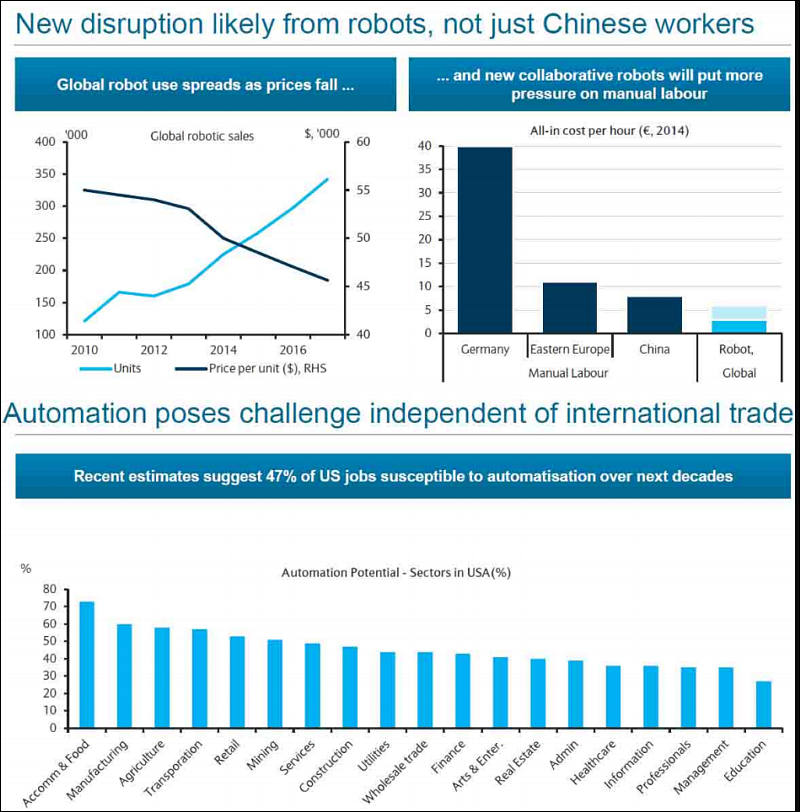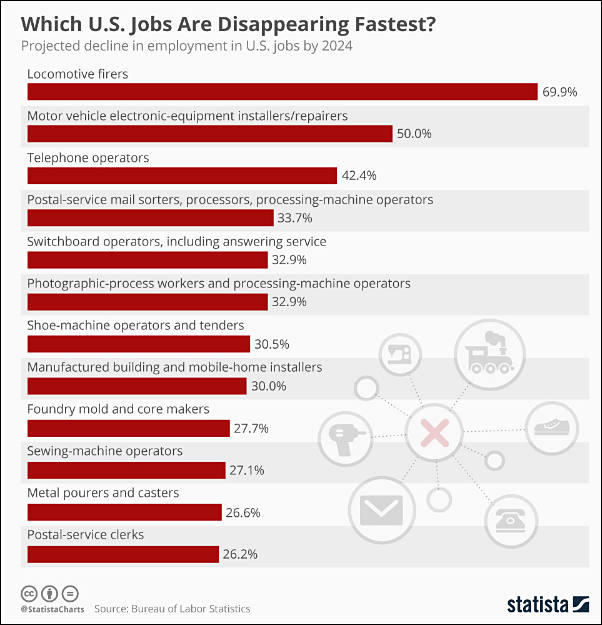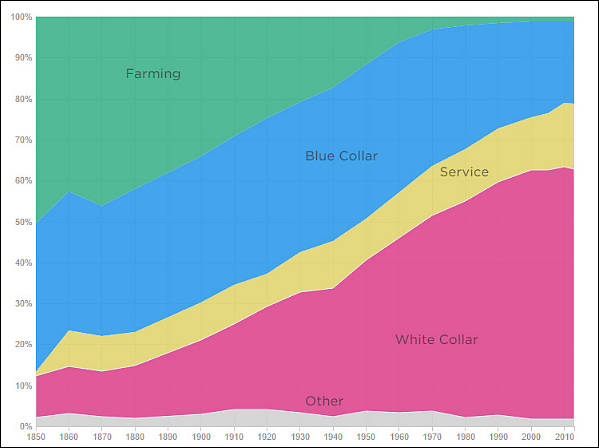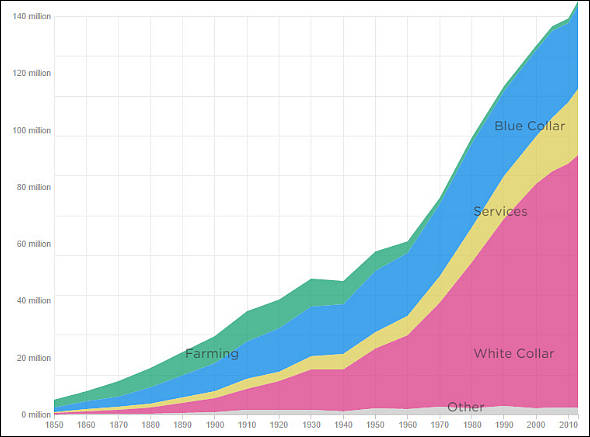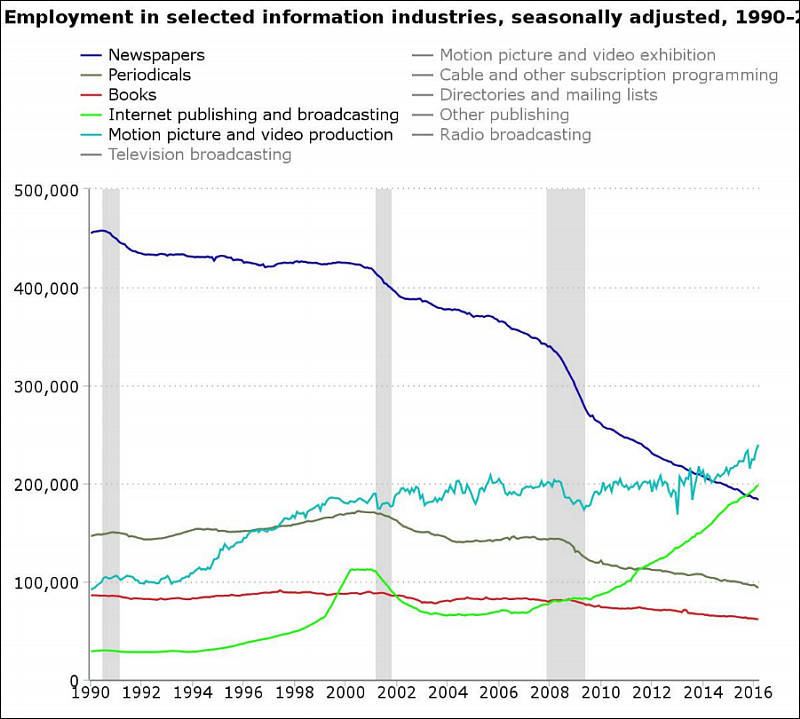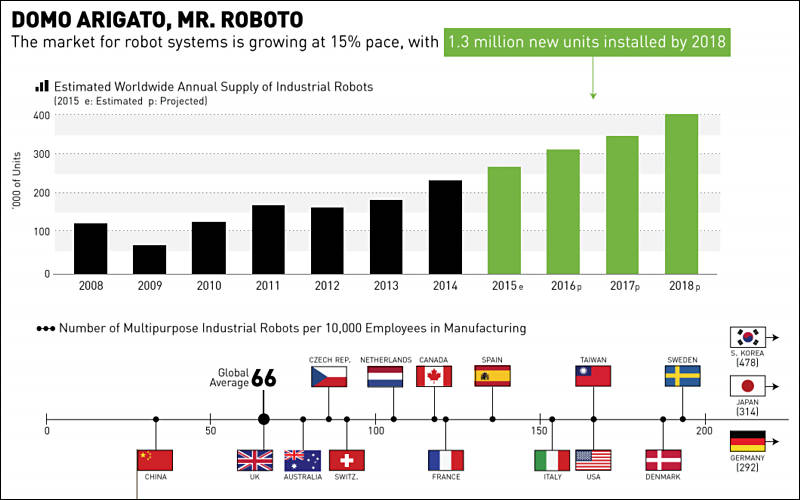
It allows to keep PV going, with more focus towards AI, but keeping be one of the few truly independent places.
-
Study found that jobs in transportation, logistics, as well as office and administrative support, are at “high risk” of automation. More surprisingly, occupations within the service industry are also highly susceptible, despite recent job growth in this sector.
Nearly half of US jobs could be susceptible to computerisation over the next two decades, study suggests.
“We identified several key bottlenecks currently preventing occupations being automated,” says Dr. Osborne. “As big data helps to overcome these obstacles, a great number of jobs will be put at risk.”
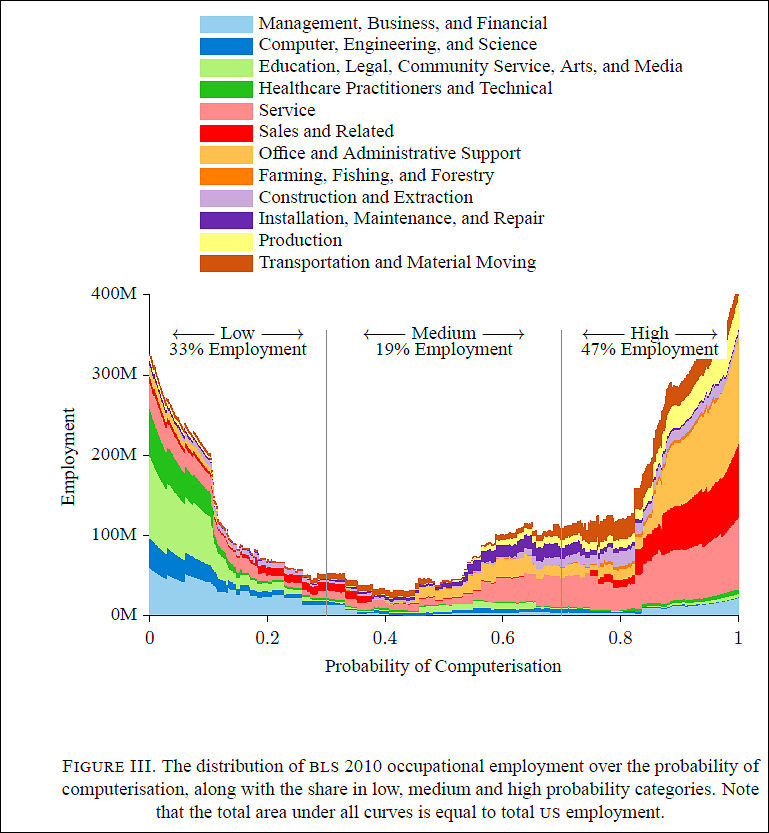
The study examined over 700 detailed occupation types, noting the types of tasks workers perform and the skills required. By weighting these factors, as well as the engineering obstacles currently preventing computerisation, the researchers assessed the degree to which these occupations may be automated in the coming decades.
“Our findings imply that as technology races ahead, low-skilled workers will move to tasks that are not susceptible to computerisation — i.e., tasks that required creative and social intelligence,” the paper states. “For workers to win the race, however, they will have to acquire creative and social skills.”
Dr Frey said the United Kingdom is expected to face a similar challenge to the US. “While our analysis was based on detailed datasets relating to US occupations, the implications are likely to extend to employment in the UK and other developed countries,” he said.

 us.jpg769 x 833 - 176K
us.jpg769 x 833 - 176K -
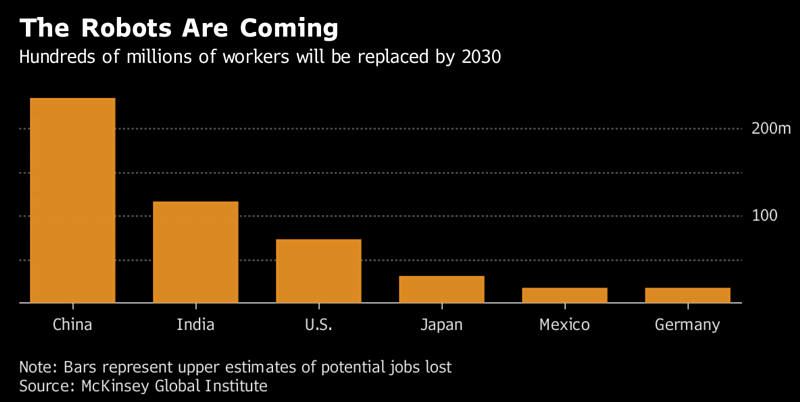
As many as 800 million workers worldwide may lose their jobs to robots and automation by 2030, equivalent to more than a fifth of today’s global labor force.
That’s according to a new report covering 46 nations and more than 800 occupations by the research arm of McKinsey & Co.

 sa813.jpg800 x 402 - 34K
sa813.jpg800 x 402 - 34K -
The thing is, robots entering the workplace isn't even really about robots. The coming age of robot workers chiefly reflects a tension that's been around since the first common lands were enclosed by landowners who declared them private property: that between labour and the owners of capital. The future of labour in the robot age has everything to do with capitalism.
-
As robots and other computer-assisted technologies take over tasks previously performed by labor, there is increasing concern about the future of jobs and wages. We analyze the effect of the increase in industrial robot usage between 1990 and 2007 on US local labor markets. Using a model in which robots compete against human labor in the production of different tasks, we show that robots may reduce employment and wages, and that the local labor market effects of robots can be estimated by regressing the change in employment and wages on the exposure to robots in each local labor market—defined from the national penetration of robots into each industry and the local distribution of employment across industries. Using this approach, we estimate large and robust negative effects of robots on employment and wages across commuting zones. We bolster this evidence by showing that the commuting zones most exposed to robots in the post-1990 era do not exhibit any differential trends before 1990. The impact of robots is distinct from the impact of imports from China and Mexico, the decline of routine jobs, offshoring, other types of IT capital, and the total capital stock (in fact, exposure to robots is only weakly correlated with these other variables). According to our estimates, one more robot per thousand workers reduces the employment to population ratio by about 0.18-0.34 percentage points and wages by 0.25-0.5 percent.
http://www.nber.org/papers/w23285.pdf
Interesting paper looking on people as on insects, who are stupid and are incapable of planning.
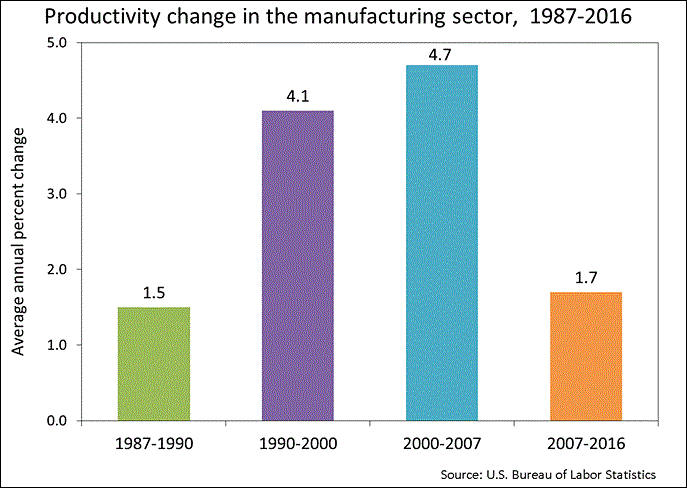
Reaction is strong with capitalism last years.

 sample1042.jpg687 x 488 - 65K
sample1042.jpg687 x 488 - 65K -
Kuka has been expanding its capacity worldwide since 2016 and is expected to increase its overall capacity by 40% by the end of 2017. The company is also aiming to double its capacity in Shanghai, China and increase its capacity in Augsburg, Germany by 30%. Kuka said that demand for universal robots has been rising as clients are looking to simplify control over their robots. Kuka has been working to improve the system to satisfy demand.
-
I think this will lead rapidly to unfathomable questions like; will labor class robots revolt against elite class robots?
Such questions always arise if you do not understand meaning of words and terms :-)
First mass textile machines actually reduced number of people required to make same amount of textile no less than robots.
-
I think this will lead rapidly to unfathomable questions like; will labor class robots revolt against elite class robots? and what will elite robots do with massive amounts of unemployed robots? and what will be the outcome of robot wars? and will robots also want to go to Mars? and would Beyoncé get album of the year if her fans were robots?
-
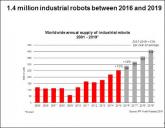
 sample725.jpg519 x 402 - 32K
sample725.jpg519 x 402 - 32K -
Worldwide spending on robotics and related services will more than double by 2020, growing from US$91.5 billion in 2016 to more than US$188 billion in 2020, according to the newly updated Worldwide Commercial Robotics Spending Guide from IDC.
-
More robot charts
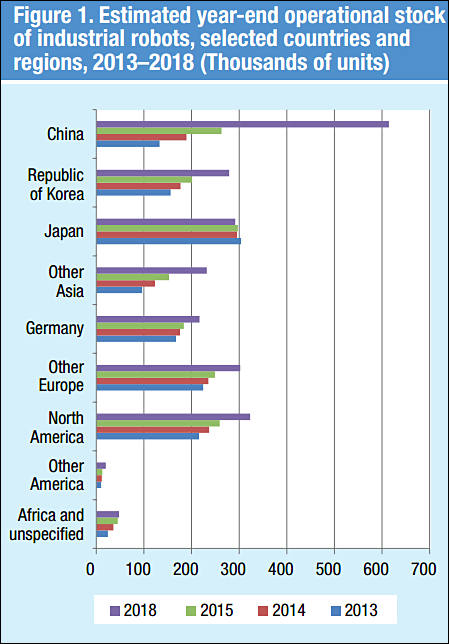
The increased use of robots in developed countries risks eroding the traditional labour cost advantage of developing countries. If robots are considered a form of capital that is a close substitute for low-skilled workers, then their growing use reduces the share of human labour in total production costs.
http://unctad.org/en/PublicationsLibrary/presspb2016d6_en.pdf
It is always fun to read greedy capitalists papers. Only in capitalism improvements in science and means of production can cause depressions and lot of poor starving people.

 img2941.jpg449 x 644 - 60K
img2941.jpg449 x 644 - 60K -
Poor tech positions
I run a job board that caters to tech jobs, primarily web professionals. We’ve been around since 2005. This year has been pretty bonkers compared to previous years.
- Roughly 40% fewer jobs were posted to our site in January 2016 compared to the average volume of every January since 2012.
- Job volume for April 2016 was nearly half the volume of April 2015.
- Currently our annual posting volume is trending at 63% compared to 2015 and 59% compared to 2014.
-
I think it is naive to believe we can find new jobs for everyone that will potentially be displaced by automation.
Such thinking come from few wrong premises.
As you implement robots you get some energy and resources freed (this is whole point to do it). And economy will still produce same amount of goods, but now this freed resources can be used for something.
Yet, whole issue is that if you want to use it efficiently you can not just offer people another similar job, and under similar I mean one that require same energy/resources expenses as previous.
You now see most horrible problem of capitalism - each new automation step bring more short term profits for less and less remaining capitalists, but same step also bring them closer to socialism that they fear so much.
-
I think it is naive to believe we can find new jobs for everyone that will potentially be displaced by automation. This is one of the reasons discussions are beginning on national minimum salaries. As automation flourishes it is reasonable to expect there will be many left with no opportunities. As those numbers increase it becomes obvious some other form of living must be presented or there will be rioting. Of course on the bright side there will be jobs keeping the rioters in check but that's a short term solution. So incarcerate costly, kill them don't think we are there yet as a society or alternative minimum national salaries. Of course many of us will be dead before it is a real issue but it won't be for our children so best to think about it. I suppose if you don't think this is reasonable even in the US we are heading that way Food Stamps, housing assistance, Medicaid, earned income credit, etc. If you put them altogether a national salary is not inconceivable.
-
Foxconn has reduced its workforce by a whopping 60,000 people thanks to the introduction of robots. Foxconn's headcount went from 110,000 down to 50,000.
-
Just exclude money from equation so they won't cloud things.
Good robot consumes around 5-10 times less energy and resources during work. And most also work perfectly 25/7.
-
CEO: $35K Robots Cheaper Than Hiring at $15 Per Hour
As fast-food workers across the country vie for $15 per hour wages, many business owners have already begun to take humans out of the picture.
======
Prison Labor USA
Prison labor in the states
Minimum wage in the United States, in dollars per hour : $5.15 Average hourly rate paid at a prison camp in Nevada : $0.13 Maximum wage paid to prisoner workers in dollars per day in Georgia and Texas : $0
Howdy, Stranger!
It looks like you're new here. If you want to get involved, click one of these buttons!
Categories
- Topics List23,993
- Blog5,725
- General and News1,355
- Hacks and Patches1,153
- ↳ Top Settings33
- ↳ Beginners256
- ↳ Archives402
- ↳ Hacks News and Development56
- Cameras2,367
- ↳ Panasonic995
- ↳ Canon118
- ↳ Sony156
- ↳ Nikon96
- ↳ Pentax and Samsung70
- ↳ Olympus and Fujifilm101
- ↳ Compacts and Camcorders300
- ↳ Smartphones for video97
- ↳ Pro Video Cameras191
- ↳ BlackMagic and other raw cameras116
- Skill1,960
- ↳ Business and distribution66
- ↳ Preparation, scripts and legal38
- ↳ Art149
- ↳ Import, Convert, Exporting291
- ↳ Editors191
- ↳ Effects and stunts115
- ↳ Color grading197
- ↳ Sound and Music280
- ↳ Lighting96
- ↳ Software and storage tips266
- Gear5,420
- ↳ Filters, Adapters, Matte boxes344
- ↳ Lenses1,582
- ↳ Follow focus and gears93
- ↳ Sound499
- ↳ Lighting gear314
- ↳ Camera movement230
- ↳ Gimbals and copters302
- ↳ Rigs and related stuff273
- ↳ Power solutions83
- ↳ Monitors and viewfinders340
- ↳ Tripods and fluid heads139
- ↳ Storage286
- ↳ Computers and studio gear560
- ↳ VR and 3D248
- Showcase1,859
- Marketplace2,834
- Offtopic1,320


